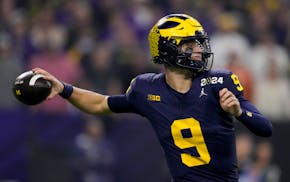On July 7, 2010, Justin Morneau slid into second base at Rogers Centre. Toronto's John McDonald, trying to turn a double play, kneed him in the head.
That innocuous collision cost Morneau almost three months of the season, a chance to dress for the playoffs and the ability to live a normal life in the fall.
On Monday, more than seven months later, Morneau arrived at Twins camp and said his concussion will keep him from playing in the Twins' early spring training games, putting him about seven months behind his initial plan for recovery.
When Morneau reflects upon the randomness of his injury and the fragility of his career, here's what he should think:
"I am one lucky human being."
In terms of sports concussions, and their treatment and diagnosis, Morneau is fortunate to live in an age of enlightenment.
Had Morneau suffered a debilitating concussion in a previous era, he might have been considered by the crustier elements in the game to be a malingerer. Despite Morneau's reputation as an admirable competitor, someone would have accused him, privately if not publicly, of being a wimp.
He would have felt compelled to try to play despite a bruised brain. He might have failed as a player, or relapsed as a patient. He might never had been the same again.
Morneau is lucky to live in an age in which even pro football, a game that glorifies violence, has begun acknowledging the effects of concussions.
Monday, Morneau thanked Twins General Manager Bill Smith for treating him with deference, and said he could miss four or five spring training games.
Two hours later, Smith told me that he expects Morneau to miss a week to 10 days of spring training games.
"You know, the former era wasn't that long ago," Smith said. "Corey Koskie went through a terrible time. And there has been so much research done in the last few years, the last five years, that there is a much better understanding of the cause, the symptoms and the treatments for concussions.
"Baseball has made great strides in the last few years. Every player in our system gets a baseline test so that if a player suffers a concussion or any kind of a head injury, we have something to measure it against.
"You hear horror stories about players who have gone through tough times, and I've had the good fortune to talk to Corey, and he's been a great help to me in understanding what a player goes through. There have been a lot of advancements and a lot of research, and we hope that Justin is one of the benefactors of that."
Koskie, the former Twin, banged his head chasing a popup while playing for the Brewers. The injury effectively ended his career. While Morneau convalesced, Koskie became an advisor for Smith and Morneau alike.
"Our goal is to make sure Justin only has to go through this once," Smith. "We want to keep him off any kind of roller coaster."
A concussion not only damages an elite athlete's ability -- it dents his mystique. Elite athletes excel because of a unique combination of physical and mental toughness, forms of toughness that do nothing to soothe a brain bruise.
Twins legend has it that Morneau once, when a starting pitcher called in sick the morning of a game in which he would have to face a powerful lineup, walked into the dining area of the old Metrodome clubhouse and wrote highly unflattering comments about that pitcher on a large white board.
Imagine what would have been whispered about Morneau in the Twins clubhouse if we didn't know now what we didn't know then.
"If this was 15 or 20 years ago, before we knew what we know now ..." Morneau said, without finishing the sentence.
"The last concussion we had on the team was in 2005, when I got hit in the head. Concussions don't happen that often in baseball. The communicating between the sports is good. We've learned a lot from the NHL and NFL, all the studies they've done, and baseball started to see it."
Smith said Morneau pushed to get back onto the field in September, hoping he could return in time for the playoffs. He pounded home runs toward Target Field's flagpole, and knew they were meaningless.
"I think the awareness has helped, in my case," Morneau said. "You look at me, and I look fine. You say, 'He's got a little headache, he may be a little off, but you see him take BP and he looks good, why can't he be out there? We're paying him to play baseball.
"I think that's one of the best things, is that I've had Billy Smith on my side saying, 'No, I want him to be better first as a person, and No. 2 as a player. He hasn't pushed the dates, he hasn't pushed any timeframe on me, and I thnk that's been a huge help. I think that's how far the concussion stuff has come, the last five, 10 years."
Jim Souhan can be heard Sundays from 10 a.m. to noon and weekdays at 2:40 p.m. on 1500ESPN. His Twitter name is Souhanstrib. jsouhan@startribune.com

Souhan: Now that's a playoff atmosphere, Minnesota!

Souhan: Should Vikings even consider McCarthy in NFL draft?

Souhan: NAW erases Suns' lead, Game 1 advantage with big performance

Souhan: This is KAT's chance to prove Flip Saunders was right

